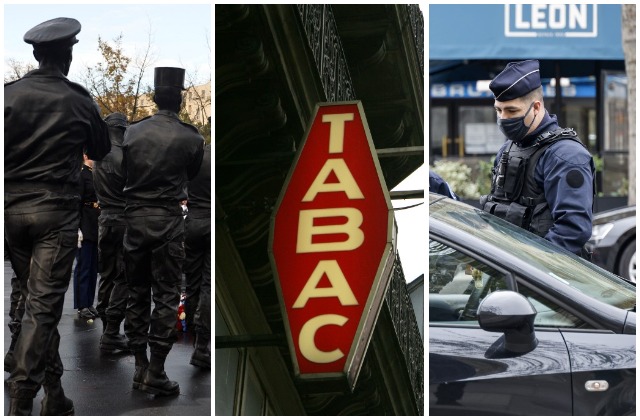A second lockdown
France has entered lockdown again, which will be in place for the entire month of November and is currently set to end on December 1st. That means the return of the now well-known attestation – the document everyone must carry to justify their outings.
While this second lockdown is almost as restrictive as the one in March, there are a few differences when it comes to when you are allowed to leave your home. As schools remain open, there are now two “permanent attestations”, one issued by employers for those going to work, one issued by schools.
READ ALSO
- Attestations: The three permission forms you need in France to leave your home
- The reasons you may leave your home during France's second lockdown
- Q&A: Answers to your questions about the rules of France's second lockdown
Gas prices increase
From November 1st gas prices will increase by 1.6 percent on average for French households because of the rising prices in the markets, according to the French Energy Regulation Commission (CRE).
Gas prices have been rising since August with a spike of 4.7 percent in October. This month the increase will be 0.4 percent for households depending on gas for cooking, 1.7 percent for those using gas for heating, and 0.9 percent for homes using gas for both purposes.
Tobacco prices increase
Cigarette prices in France have risen steadily for years. Another price hike on November 1st, by €0.50 on average, will push most brands over the symbolic €10 mark. This includes cigarettes, cigarillos, cigars and rolling tobacco.
Depending on the brand, the price of a pack of 20 cigarettes will rise from €9.50 to €10, others from €9.80 to €10.30 or €10 to €10.50. Here are a list of all the brands of tobacco and their respective price hike.
The French government helps smokers quit
For those wanting to quit what has become an increasingly expensive habit, November 1st also marks the first day of the Mois sans tabac (Month without tobacco), a government led campaign to convince people to quit smoking.
À J-3 d’une nouvelle vie sans tabac, vous êtes remonté à bloc non ? pic.twitter.com/NlVCFoc4mn
— #MoisSansTabac (@Mois_sans_tabac) October 29, 2020
Armistice Day
November 11th marks the “eleventh hour of the eleventh day of the eleventh month” of 1918, when the Allies and Germany signed the Armistice of World War I at Compiègne in France.
Armistice Day is a public holiday, so it normally means everyone gets the day off.
Usually there military parades and other activities going on that day, but with the lockdown it's unsure what this year's celebration will look like.
The 'winter truce' begins
The winter truce, called la trêve hivernale runs from November 1st to March 31st. During this period, French landlords are not legally allowed to evict their tenants.
Set up as a means to prevent people from becoming homeless and end up sleeping rough during winter, water and power cuts are also forbidden during the winter truce.
However, there are three exceptions that could allow a landlord to boot his tenant out in the winter: if the home is in danger, if the tenant gets another place to live or if the home is squatted.
This spring, the government extended the truce with several months due to the exceptional conditions caused by the lockdown.
Dans quelques jours débutera la #trevehivernale des #expulsionslocatives. Dans un contexte sanitaire et social alarmant, la Fondation @Abbe_Pierre exprime son inquiétude. https://t.co/ug4ffuOno7
— FondationAbbéPierre (@Abbe_Pierre) October 27, 2020
Reduced banking fees for some
From November 1st, banks will limit their fees to €25 for some clients for a period of three months (€20 if they have a special deal). Those concerned are those in a “vulnerable” economic situation, according to the criteria listed at the French government's website.
Don't forget to pay your residence tax and TV licence fee
Although 80 percent of taxpayers in France no longer have to pay the residence tax (taxe d'habitation) in 2020, 20 percent of the most wealthy still have to pay it until 2022. The deadline to pay this tax is November 16th by post and November 21st online.
Households equipped with a TV have to pay the €138 TV licence fee. The deadlines are the the same as those for the residence tax.
Priority flu vaccination for over-65s
France has launched a major campaign to get people vaccinated with the aim of avoiding flooding hospitals with both flu and Covd-19 patients this winter.
The campaign officially started on October 13th and runs until January 31st, although health authorities are prioritising vulnerable groups until November 30th.
These are:
- Over 65s
- People with chronic or long-term health conditions
- People with a BMI of 40 or over
- Pregnant women
- People who live with those who cannot be vaccinated, including babies and those who are immunocompromised
READ MORE What you need to know about France's 2020 flu vaccination campaign
One of our favourite French TV series is back..
And seeing as we all might need something to cheer us up these weeks, the final season of the extremely binge-worthy show Dix pourcent (Ten percent) is out. If you don't know it, we recommend you curl up with a blanket and some popcorn, and enjoy.
#DixPourCent Saison 4, c'est maintenant sur France 2 ! pic.twitter.com/SGibFhZn6W
— DIX POUR CENT (@dixpourcent_F2) October 21, 2020



 Please whitelist us to continue reading.
Please whitelist us to continue reading.
The public holiday on 11 November falls on a Wednesday not a Sunday…
The public holiday on 11 November falls on a Wednesday not a Sunday…
Time for a new calendar…Nov 11 is a Wednesday, not a Sunday!